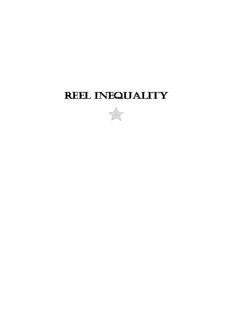
Reel Inequality: Hollywood Actors and Racism PDF
Preview Reel Inequality: Hollywood Actors and Racism
Reel Inequality ✮ Reel Inequality ✮ Hollywood Actors and Racism Nancy Wang Yuen rruuttggeerrss uunniivveerrssiittyy pprreessss nneeww bbrruunnsswwiicckk,, nneeww jjeerrsseeyy,, aanndd lloonnddoonn Library of Congress Cataloging-in-Publication Data Names: Yuen, Nancy Wang, 1976– author. Title: Reel inequality : Hollywood actors and racism / Nancy Wang Yuen. Description: New Brunswick, New Jersey : Rutgers University Press, 2016. | Includes bibliographical references and index. Identifiers: LCCN 2016012315| ISBN 9780813586304 (hardcover : alk. paper) | ISBN 9780813586298 (pbk. : alk. paper) | ISBN 9780813586311 (e-book (epub)) | ISBN 9780813586328 (e-book (web pdf)) Subjects: LCSH: Minorities in the motion picture industry—United States. | Motion picture industry—United States—Employees. | Race discrimination— United States. | Discrimination in employment—United States. Classification: LCC PN1995.9.M56 Y83 2016 | DDC 791.43089/96073—dc23 LC record available at https://lccn.loc.gov/2016012315 A British Cataloging-in-Publication record for this book is available from the British Library. Copyright © 2017 by Nancy Wang Yuen All rights reserved No part of this book may be reproduced or utilized in any form or by any means, electronic or mechanical, or by any information storage and retrieval system, without written permission from the publisher. Please contact Rutgers University Press, 106 Somerset Street, New Brunswick, NJ 08901. The only exception to this prohibition is “fair use” as defined by U.S. copyright law. Visit our website: www.rutgersuniversitypress.org Manufactured in the United States of America For Spencer, Tabitha, and Eden CCOONNTTEENNTTSS Acknowledgments ix Introduction 1 1 Hollywood’s Whitest 19 2 Hollywood’s Colorblind Racism 49 3 Hollywood’s Typecasting 69 4 Hollywood’s Double Bind 82 5 Surviving Hollywood 93 6 Challenging Hollywood 106 7 Diversifying Hollywood 138 Appendix A: Media Advocacy Organizations 161 Appendix B: Methods 165 Notes 167 Selected Bibliography 199 Index 203 vii ACKNOWLEDGMENTS As the first in my family to earn a doctorate and to write a book, I am indebted to the artists, mentors, friends and family who sus- tained me through sixteen years of research and writing. I began my research in 2000 at a panethnic theater in Southern California. The vibrant young artists of color embraced me and told me about their adventures in racist Hollywood. I am grateful to them and all of the actors and industry personnel who generously imparted me with their stories. Special thanks to Philip W. Chung and Clyde Kusatsu for sharing their industry knowledge and contacts. My UCLA advisors were the first to read, encourage, and cri- tique my research. When I doubted whether anyone in academia cared about Hollywood actors, Bob Emerson wisely explained the built-in popular interest in my work. Steve Clayman’s kindness sustained me through grad school and beyond. He and John Heritage took a chance on me as a research assistant and taught me how to analyze media data. Min Zhou, whose mentorship began in my undergraduate years, opened doors for me to pursue a PhD in sociology and to publish my earliest research on Asian American actors. Rebecca Emigh’s dedication, investment, and love made me a sociologist. Darnell Hunt’s training in content ix x acknowledgments analysis, ongoing mentorship, and research shaped me into a media scholar. Book writing and publishing is a complex process fraught with mystery, heartache, elation and fatigue. I am deeply indebted to my friends Gilda Ochoa, Hung Thai, Faustina DuCros, Leisy Abrego, Christina Sue, Noriko Milman, Christina Chin, Shelley Garcia, Chinyere Osuji, Arpi Miller, Zulema Valdez, David Cook, Anthony Ocampo, Maria Su Wang, Susan Lim, Jenny Lee, Timothy Clark, Sarah Liu, Rebecca Hong, Esther Chung-Kim, and Jane Hong, for reading drafts, mentoring me, and keeping me accountable through- out the long journey. Thanks to Jooyoung Lee for suggesting the cover design. Thanks to my Biola colleagues and students (present and former)—Brad Christerson, Deshonna Collier-Goubil, Stephanie Chan, LaDawn Prieto Johnson, Cassandra Van Zandt, Carlos Delgado, Diana Rongavilla, Janelle Paule and many others for wishing me success. I also appreciate Eugene Hung, Linda Bugge Perez, Mandy Robles, Julie Nievas-Barajas, Jason Chung, Lisa Cortez, Katie Liddicoat, Gil Gonzalez, Amber Janeczek, Kelli Clifton, Heidi Beltran Santillan, Nadina De Souza and all of my friends for cheering me on and assuring me that my work has significance beyond academia. Thanks to the editors and copy editors I worked with—Jenny Gavacs, Jude Berman, Pam Suwinsky, and, most of all, Leslie Mitchner—who believed in my book. Thanks to the entire Rutgers University Press team for making this book happen. I also appreci- ate the anonymous readers whose comments improved my writing and whose critiques helped me develop a thicker skin. Deepest thanks to my research assistants, Steven Morrow and Karissa Yaw, for their data coding and graphic support. I am also grateful to the National Science Foundation and UCLA for funding my early research, and to Biola University for the grant and sabbatical that made my writing possible.
Description: